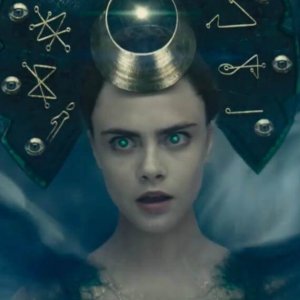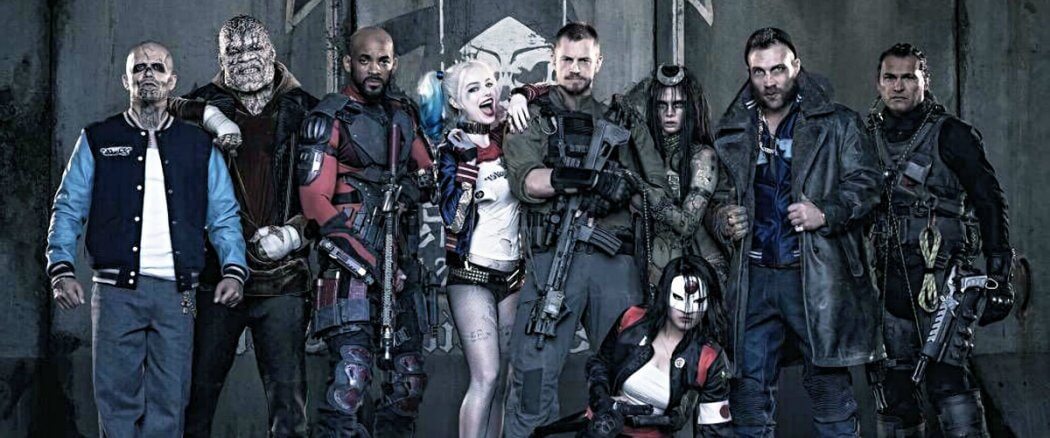Critics have not taken kindly to the DC Cinematic Universe. At three films in, the Rotten Tomatoes scores are as follows: 55% for Man of Steel, 27% for Batman v Superman, and 26% for Suicide Squad. By comparison, the lowest Rotten Tomatoes score of the 13 films released in the Marvel Universe since 2008 is 67% for The Incredible Hulk (which most people don’t count anyway) and the top score still goes to their first film out of the gate, Iron Man, at 94%.
What is it about DC that critics find so troubling? I wish I knew. While it’s true that Marvel is beating DC in quality, only Man of Steel is a bad film. I’m a Batman v Superman defender. 27%? That’s a score indicative of a train wreck. And now we have Suicide Squad. Once again the critics had me anticipating disaster, and once again I’m surprised at how entertaining it is.
Maybe the bad reviews are helping me appreciate these films more. When the bar is low, it’s easier to appreciate the good. Suicide Squad has flaws, but it’s still a film worth seeing. The death of DC has been greatly exaggerated.
Hype vs. Reality
The disappointment over Suicide Squad may have a lot to do with misleading marketing. Count me in as one of the deceived. Articles leading up to the film were all focused on one thing: Jared Leto as The Joker. They talked about Leto’s method acting, how terrifying he was on set, and the morbid gifts he sent his co-stars. Trailers for the movie followed suit. The impression was that this was a film about The Joker heading up a ragtag group of anti-heroes.
Needless to say, audiences were taken aback when The Joker proved to be nothing more than a sideshow diversion. The movie is really about a government agent pooling together a group of talented criminals to stop an ancient witch from destroying the world. The Joker? He isn’t in the actual suicide squad at all. In fact, he has less than 15 minutes of total screen time.
 Fans flipped out. One is even suing Warner Bros. But here’s the good news: Suicide Squad works without Leto at the center. This is David Ayer’s film after all, and he provides the right amount of energy and pacing to keep things clipping along. That is, until an effects-heavy climax sends things out with a whimper.
Fans flipped out. One is even suing Warner Bros. But here’s the good news: Suicide Squad works without Leto at the center. This is David Ayer’s film after all, and he provides the right amount of energy and pacing to keep things clipping along. That is, until an effects-heavy climax sends things out with a whimper.
The hype was right about one thing though: Leto is incredible. The Joker has been played a myriad of different ways over the years, but Leto offers a unique and satisfying take. Leto’s Joker is a juvenile psychopath; hungry for power, unfettered by rules and morals, ready to die at any moment and take the whole world with him.
He’s also in love with a woman who’s every bit his match. Margot Robbie’s Harley Quinn is the standout of the film. She’s crazy, seductive, and lethal — bouncing around from one high to the next. And she’ll do anything for her lover. Their relationship is a twisted take on discipleship. “Would you die for me?” Leto asks. “No, too easy,” he rebuts himself. “Would you live for me?” Quinn worships The Joker and he worships her right back. There’s a Harley Quinn standalone project in the works. Here’s hoping these two take center stage.
DC vs. Marvel
Suicide Squad highlights a number of reasons why Marvel currently holds the edge over the DC Universe. First off, Marvel has a plan. Beginning with Iron Man, every course of the Marvel Universe was carefully plotted out years in advance. DC feels more haphazard. We started off getting to know Superman in the lackluster Man of Steel, and then were launched into a battle with a brand new Batman (with Wonder Woman along for the ride), and now have switched gears completely with a new cast of anti-heroes. I still don’t feel like I know any of these characters.
By contrast, Marvel was patient. We were given time to appreciate Iron Man, Thor, and Captain America. When they came together in The Avengers, we were invested. The Suicide Squad in the film is made up 8 different characters. I felt emotionally vested in two: Harley Quinn and Deadshot. The rest were expendable. One could argue that these are minor characters in the grand scope of DC. But think about the “minor” characters in Marvel like Jessica Jones, Matt Murdock, and Luke Cage. Each of them received a standalone TV series in preparation for their upcoming team-up special. DC cut to the chase too fast, and Marvel is reaping the benefits.
 Furthermore, there’s a contrast in the two universes between science and magic. On the whole, Marvel is a more practical, down-to-earth reality. Tony became Iron Man through his engineering skills. Steve Rogers became Captain America through a muscle-enhancing serum. Suicide Squad, on the other hand, presents us with a character called Enchantress — an ancient witch firmly in the realm of the mystical. She floats in and out of time and space, and turns into a CGI eye-roll fest after achieving full power. The difference in impact is tangible. Marvel revels in the plausible. DC revels in the fantastical. Both can be fun, but Marvel delivers the stronger connection.
Furthermore, there’s a contrast in the two universes between science and magic. On the whole, Marvel is a more practical, down-to-earth reality. Tony became Iron Man through his engineering skills. Steve Rogers became Captain America through a muscle-enhancing serum. Suicide Squad, on the other hand, presents us with a character called Enchantress — an ancient witch firmly in the realm of the mystical. She floats in and out of time and space, and turns into a CGI eye-roll fest after achieving full power. The difference in impact is tangible. Marvel revels in the plausible. DC revels in the fantastical. Both can be fun, but Marvel delivers the stronger connection.
Finally, there’s a contrast in tone. Marvel films on the whole are bright and colorful. DC films are dark and grim. In one way, it’s a nice alternative for DC. The darker edge raises the stakes. But the doom and gloom grows wearisome in every DC film. There are too many rainy days and dark nights. I always find myself missing Marvel’s exuberant spirit.
Law vs. Grace
One benefit of the bleaker landscape is the ability to explore darker themes. I was thrilled at one theme in particular in Suicide Squad which revealed itself toward the end of the film: the concept of law vs. grace. WARNING: SPOILERS AHEAD
Everyone in a position of authority treats the members of the Suicide Squad like buckets of scum; and frankly, for good reason. These are hardened criminals known for their wicked deeds and lethal intent. Turn your back on them, and they’ll eat you for breakfast. To keep them in line, the leader of the Suicide Squad initiative comes up with a fail-safe. Each member of the squad receives a bomb implanted in their brain. With the slightest push of a button on a smartphone app, their heads will explode.
Colonel Rick Flagg (Joel Kinnaman) heads up the Suicide Squad expedition when they launch out to face Enchantress. Flagg reminds the squad every chance he can that he has total power over them. He pulls out his phone with pictures of their faces as a threat whenever they get rowdy. And the crew learns early on that he’s not bluffing when one of them attempts an escape and Flagg kills him on the spot. Reluctantly, the squad complies with every order they’re given. Why? They don’t have a choice.
 But something remarkable happens late in the movie. Will Smith’s Deadshot figures out the true purpose of their mission and decides fighting a witch with unlimited powers isn’t the way he wants to die. He’d rather go out with a drink in his hand. So he tells Flagg to go ahead and blow him up, and then firmly plants himself in a bar. To Flagg’s surprise, the rest of the squad follows suit. Suddenly, his power over them is lost. That’s when Flagg becomes a human being. He enters the bar and explains why this mission is personal. Enchantress has possessed the woman he loves, and he desperately wants her back. Then he does the unthinkable. He takes his cell phone and smashes it to pieces. Suddenly Flagg is just a man with tears in his eyes begging for help.
But something remarkable happens late in the movie. Will Smith’s Deadshot figures out the true purpose of their mission and decides fighting a witch with unlimited powers isn’t the way he wants to die. He’d rather go out with a drink in his hand. So he tells Flagg to go ahead and blow him up, and then firmly plants himself in a bar. To Flagg’s surprise, the rest of the squad follows suit. Suddenly, his power over them is lost. That’s when Flagg becomes a human being. He enters the bar and explains why this mission is personal. Enchantress has possessed the woman he loves, and he desperately wants her back. Then he does the unthinkable. He takes his cell phone and smashes it to pieces. Suddenly Flagg is just a man with tears in his eyes begging for help.
The squad could kill him in an instant. And why wouldn’t they? He was a jerk to them from minute one. Instead they agree to help, not as prisoners but equals. When Flagg had power over them, there was hatred on both sides. But when that power is lifted, they become friends and fight Enchantress as one. Isn’t this the Gospel?
We could have had a much different Jesus. The Son of God could have come down and shown us who was boss. He could have stuck our noses in our sin and made us grovel at his feet. He could have destroyed anyone who opposed him with fire from heaven. That was his right, but he chose a different way. Jesus reached into our brokenness and extended love. He withheld the judgment we deserved, so we could go free. That’s the difference between law and grace.
This contrast has dramatic implications for every facet of our lives. As parents, we can get angry with our kids when they make mistakes or gently lead them to a better way. As bosses, we can rule our employees with an iron fist or practice servant-leadership. As policemen, we can lord our power over others or lower our guard to protect and serve. No relationship is exempt. The Apostle Paul made that clear. “In your relationships with one another, have the same mindset as Christ Jesus: ‘Who, being in very nature God, did not consider equality with God something to be used to his own advantage; rather, he made himself nothing by taking the very nature of a servant. (Philippians 2:5-7). (See the story of The Good Samaritan if you’re still looking for an exception.)
That isn’t to say we shouldn’t have prisons. We’re called to love our neighbor which means not letting killers on the loose to harm them. But we’re also called to love our enemies which means treating even the most vile offender with compassion. The Suicide Squad puts their lives on the line for Flagg when they no longer have to. That’s the power of grace.
Past vs. Future
Compared to Marvel, the DC Universe is off to a shaky start. Critics have given a scarlet letter to every film released so far, and when it comes to longevity, perception is paramount. Ultimately, Suicide Squad is everything that’s right and wrong with DC. It’s another gloomy affair with uneven pacing and a yawn-filled climax. But it’s also fun and edgy with flashes of brilliance. DC isn’t a car crash, just a mixed bag.
Thankfully, the future looks brighter. A standalone Batman film is on the way directed by Ben Affleck himself. Say what you want about Affleck, but there’s no mistaking his talent behind the lens. His last movie, Argo, was the best picture winner of 2012. There’s also Justice League which previewed some early footage at Comic-Con. Zach Snyder doesn’t live under a rock. He’s heard the negative reactions to BvS, and he’ll be looking to win fans back.
DC can’t change the past. Revisiting this universe from the beginning will always be disappointing compared to Marvel. But there’s a saying in the movie business: “You’re only as good as your last film.” If DC can pull together a masterpiece, even the critics will be lining up to forgive.





